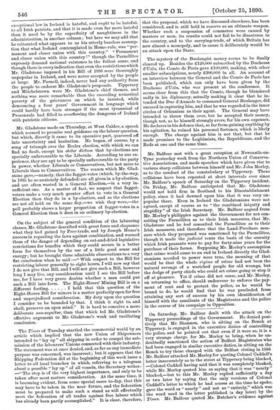Mr. Balfour met with a great reception at Newcastle-on- Tyne
yesterday week from the Northern Union of Conserva- tive Associations, and made speeches which have given rise to various sharp collisions between himself and Mr. John Morley, as to the conduct of the constabulary at Tipperary. These collisions have been repeated at short intervals ever since Mr. Balfour's speech of Saturday on the Tipperary incident. On Friday, Mr. Balfour anticipated that Mr. Gladstone
would not hold firm in Scotland to his Disestablishment policy, since it had dawned upon him that it was very un- popular there. Even in Ireland the Gladstonians were not agreed, except of course as to " the combined iniquity and stupidity" of the Irish Secretary. Mr. Balfour argued from Mr. Morley's philippics against the Government for not con- sulting the Parnellites as to their Irish measures, that Mr. Gladstone and he had consulted the Parnellites as to their Irish measures, and therefore that the Land-Purchase mea- sure which they proposed was sanctioned by the Parnellites, though it made the judicial rents the basis of the annuity which Irish peasants were to pay for forty-nine years for the purchase of their farms. Supposing Mr. Morley's assumption that crime would come to an end in Ireland directly the Glad- stonians acceded to power were true, the meaning of that would be that the whole regime of crime had not been the natural revenge of a wretched people for old wrongs, but the dodge of party chiefs who could set crime going or stop it off at pleasure. Yet if crime did not cease, and Mr. Morley, on returning to office, should endeavour to enforce the pay- ment of rent and to protect the police, as he would be bound to do, he would find that he was precluded from attaining any sort of success by his own identification of himself with the assailants of the Magistrates and the police in the course of his campaign in Opposition.






































 Previous page
Previous page